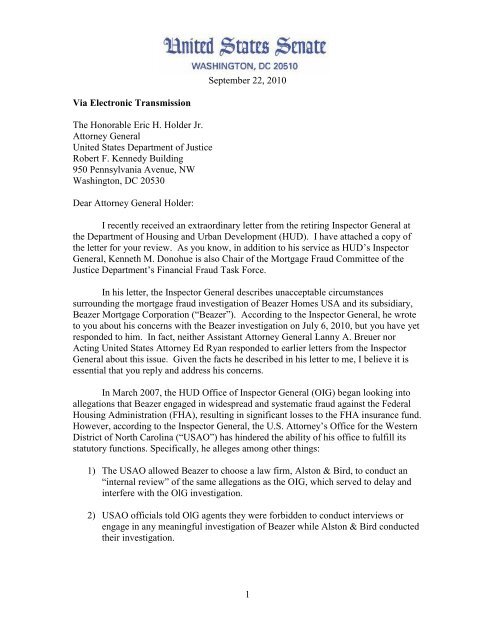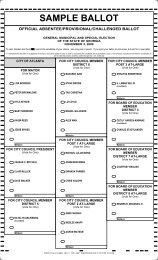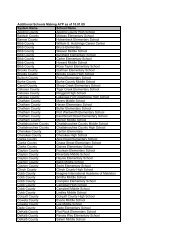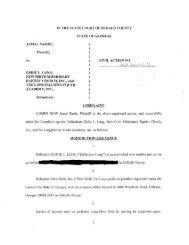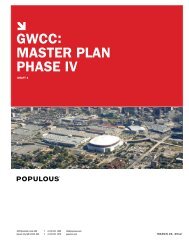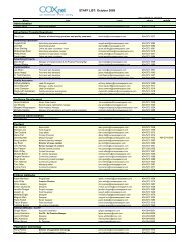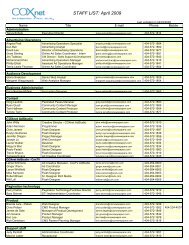1 September 22, 2010 Via Electronic Transmission The Honorable ...
1 September 22, 2010 Via Electronic Transmission The Honorable ...
1 September 22, 2010 Via Electronic Transmission The Honorable ...
You also want an ePaper? Increase the reach of your titles
YUMPU automatically turns print PDFs into web optimized ePapers that Google loves.
<strong>Via</strong> <strong>Electronic</strong> <strong>Transmission</strong><br />
<strong>The</strong> <strong>Honorable</strong> Eric H. Holder Jr.<br />
Attorney General<br />
United States Department of Justice<br />
Robert F. Kennedy Building<br />
950 Pennsylvania Avenue, NW<br />
Washington, DC 20530<br />
Dear Attorney General Holder:<br />
<strong>September</strong> <strong>22</strong>, <strong>2010</strong><br />
I recently received an extraordinary letter from the retiring Inspector General at<br />
the Department of Housing and Urban Development (HUD). I have attached a copy of<br />
the letter for your review. As you know, in addition to his service as HUD’s Inspector<br />
General, Kenneth M. Donohue is also Chair of the Mortgage Fraud Committee of the<br />
Justice Department’s Financial Fraud Task Force.<br />
In his letter, the Inspector General describes unacceptable circumstances<br />
surrounding the mortgage fraud investigation of Beazer Homes USA and its subsidiary,<br />
Beazer Mortgage Corporation (“Beazer”). According to the Inspector General, he wrote<br />
to you about his concerns with the Beazer investigation on July 6, <strong>2010</strong>, but you have yet<br />
responded to him. In fact, neither Assistant Attorney General Lanny A. Breuer nor<br />
Acting United States Attorney Ed Ryan responded to earlier letters from the Inspector<br />
General about this issue. Given the facts he described in his letter to me, I believe it is<br />
essential that you reply and address his concerns.<br />
In March 2007, the HUD Office of Inspector General (OIG) began looking into<br />
allegations that Beazer engaged in widespread and systematic fraud against the Federal<br />
Housing Administration (FHA), resulting in significant losses to the FHA insurance fund.<br />
However, according to the Inspector General, the U.S. Attorney’s Office for the Western<br />
District of North Carolina (“USAO”) has hindered the ability of his office to fulfill its<br />
statutory functions. Specifically, he alleges among other things:<br />
1) <strong>The</strong> USAO allowed Beazer to choose a law firm, Alston & Bird, to conduct an<br />
“internal review” of the same allegations as the OIG, which served to delay and<br />
interfere with the OlG investigation.<br />
2) USAO officials told OlG agents they were forbidden to conduct interviews or<br />
engage in any meaningful investigation of Beazer while Alston & Bird conducted<br />
their investigation.<br />
1
3) <strong>The</strong> USAO attempted, without authority, to prohibit HUD from pursuing civil or<br />
administrative remedies against Beazer.<br />
4) <strong>The</strong> USAO showed excessive deference to the, Alston & Bird’s “internal review,”<br />
which cost Beazer $35 to $50 million, thus reducing the funds available to<br />
compensate individual victims of the mortgage fraud and the FHA insurance fund.<br />
5) <strong>The</strong> USAO failed to consult with HUD and the FHA regarding the deferred<br />
prosecution agreement that it entered into with Beazer as a result, the proposed<br />
settlement provided too little restitution to HUD compared to the losses it<br />
sustained.<br />
6) Following the settlement with Beazer, the USAO removed OIG agents from the<br />
investigation in retaliation for not supporting the proposed deferred prosecution<br />
agreement and for conferring with department officials.<br />
Moreover, the Inspector General notes that the President recently appointed two<br />
former partners at Alston & Bird, the law firm that represented Beazer to serve as U.S.<br />
Attorneys for the Eastern and Western District of North Carolina. Obviously that raises<br />
questions about the working relationship between the OIG and the USAOs in North<br />
Carolina on Beazer-related investigations going forward.<br />
Since these are such serious and substantive concerns, I am frankly shocked that<br />
you would not address them with the Inspector General immediately. Someone needs to<br />
be watching out for the taxpayers and ensuring that those who committed the very types<br />
of fraud that led to the financial crisis are held personally responsible. <strong>The</strong> Justice<br />
Department owes Americans a detailed explanation of its actions in this case.<br />
Accordingly, please provide written answers to the following questions:<br />
1) According to the deferred prosecution agreement, Beazer agreed to terminate<br />
executives and employees “it identified as responsible” for the misconduct.<br />
a. How many executives and employees have been terminated?<br />
b. What are their names, positions, salaries, and dates of termination?<br />
c. How did Beazer identify these employees for termination?<br />
d. Why and under what authority was the OlG removed from the<br />
investigation preventing these executives and employees from being held<br />
accountable and subject to potential criminal prosecution?<br />
e. Why was the OIG being prohibited from determining whether other<br />
executives and employees may also be culpable in the fraud?<br />
2
f. Provide the names of individuals and details of those that have been<br />
indicted or prosecuted so far in this investigation.<br />
2) As you recall, I recently wrote to you regarding the Justice Department’s practice<br />
of funneling money from victim compensation funds to advocacy organizations.<br />
<strong>The</strong> deferred prosecution agreement in this case also established a victim<br />
compensation fund.<br />
a. How much has Beazer deposited into the fund to date?<br />
b. Are there any plans or arrangements to provide any of the funds to anyone<br />
other than victims of Beazer’s mortgage fraud?<br />
c. How much money has been distributed to how many victims of Beazer’s<br />
mortgage fraud to date?<br />
d. How much compensation has been provided to the FHA to compensate for<br />
its losses?<br />
e. What is total amount of FHA losses attributable to Beazer’s Mortgage<br />
fraud?<br />
f. Why did the Department agree to a settlement allowing Beazer to limit its<br />
liability for losses to the FHA and individual victims of its fraud, when<br />
they had sufficient resources to pay $35 to $50 million for Alston & Bird<br />
to conduct a parallel investigation?<br />
Thank you for your attention and assistance on this matter. I would appreciate<br />
your response to my questions by no later than October 6, <strong>2010</strong>. Should you have any<br />
questions regarding this letter, please do not hesitate to contact Jason Foster at (202) <strong>22</strong>4-<br />
4515. Any formal correspondence should be sent electronically in PDF searchable<br />
format to Brian_Downey@finance-rep.senate.gov.<br />
Sincerely,<br />
Charles E. Grassley<br />
United States Senator<br />
cc: Members of the United States Senate Committee on the Judiciary<br />
<strong>The</strong> <strong>Honorable</strong> Shaun L. S. Donovan, Secretary of the United States Department of<br />
Housing and Urban Development<br />
Attachment<br />
3


